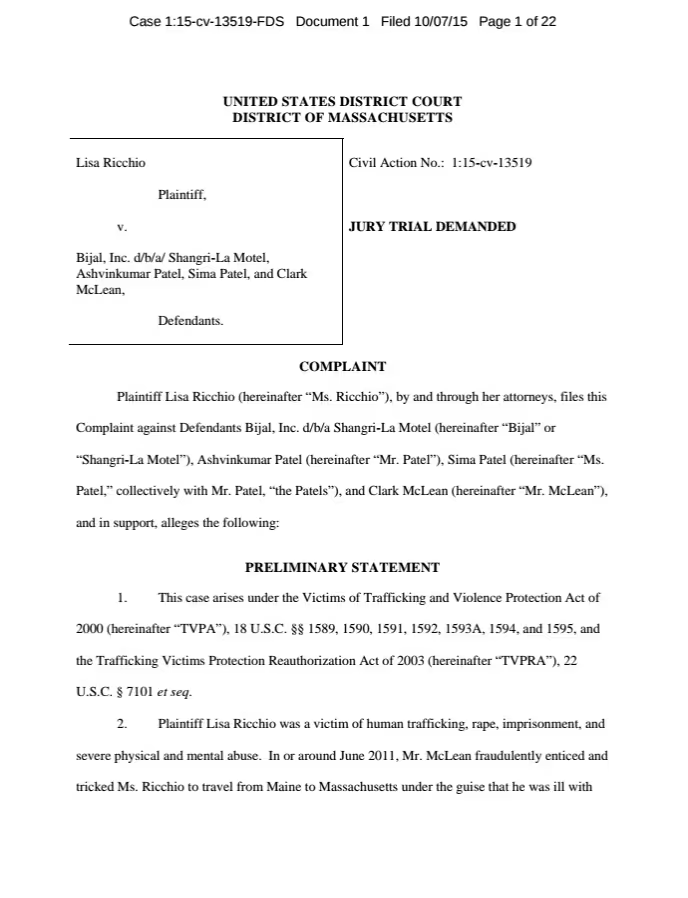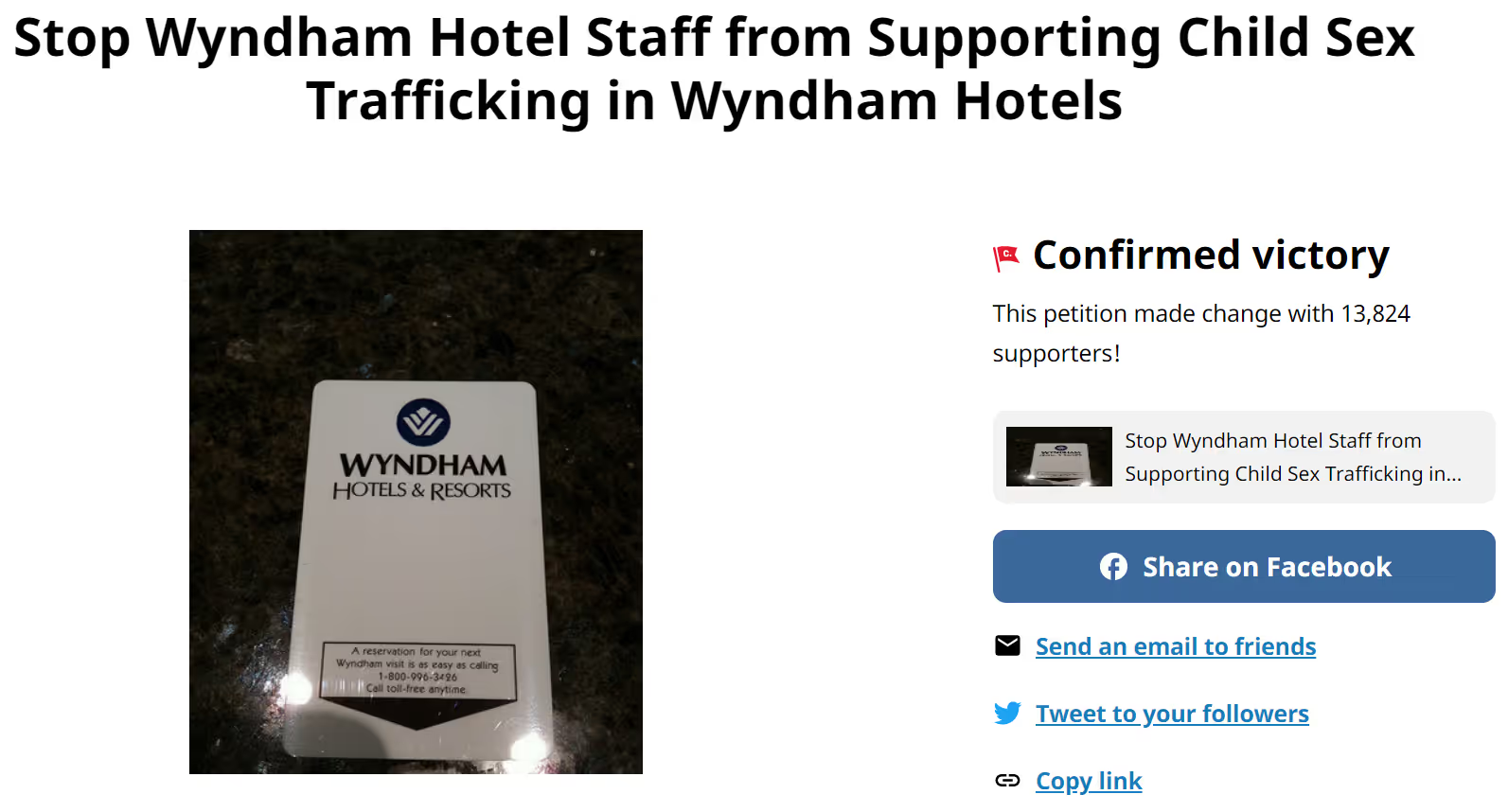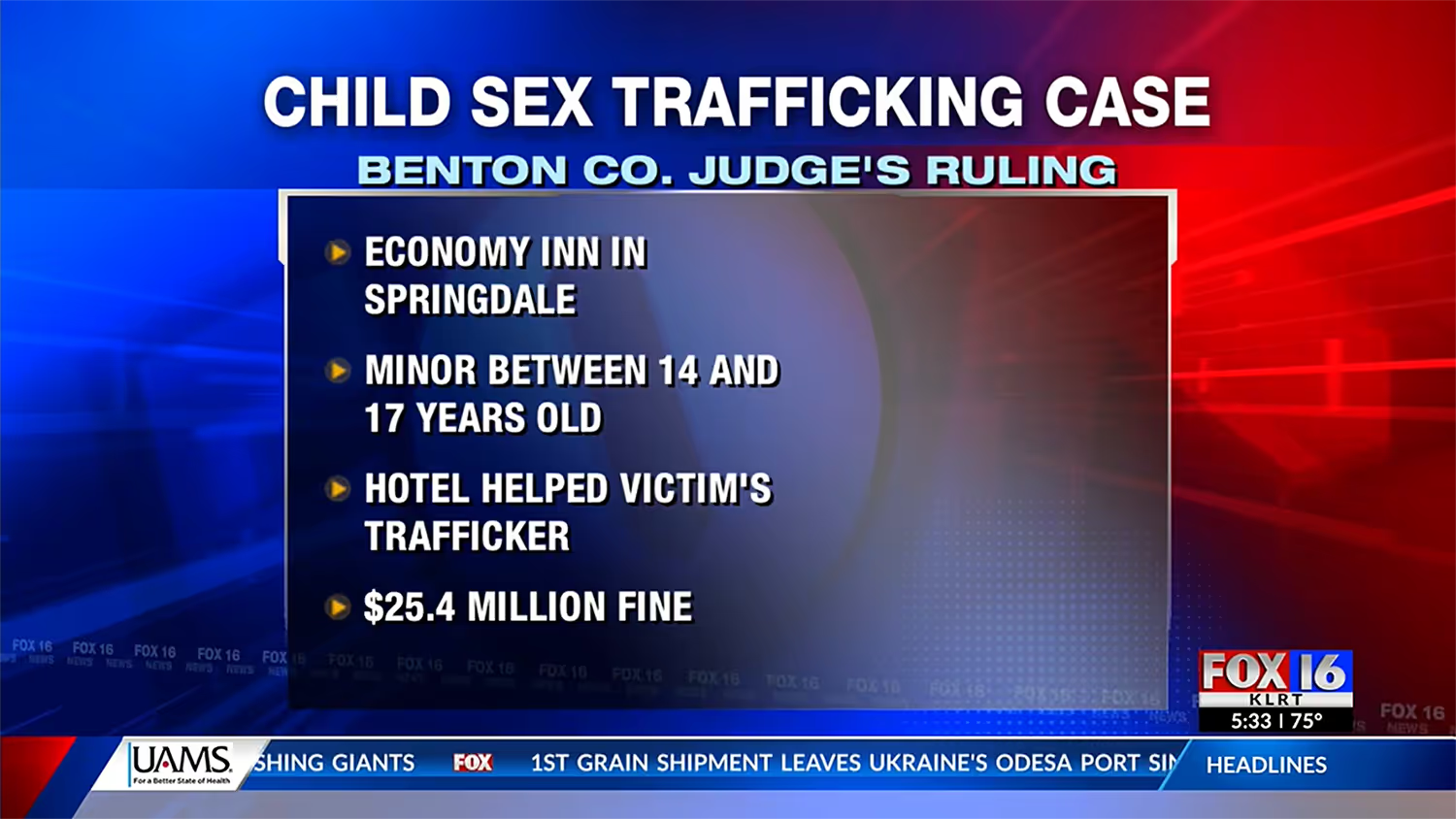Hotels Involved in Human Trafficking: 5 Real Examples
There have been hotel franchises that have come under fire for neglecting to interfere in these cases. This complacency, whether due to poor training or no training at all, has cost each of these corporations greatly.

According to the Polaris Project, 75% of human trafficking survivors report having come into contact with hotels during their trafficking experience.
It’s no secret that traffickers take advantage of hotel franchises to help facilitate their business.
Unfortunately, according to that same study, 94% of survivors say hotel staff did not show concern nor offer any help.
The Polaris Project also reports that there were 482 potential labor trafficking survivors since January 2015 that report working in the hotels. These survivors in the supply chain of the hotel mostly hold jobs such as housekeeping subcontractors. Due to these employees not being direct hotel hires, they’re much more vulnerable to abuse such as lack of pay and working unfit hours.
Trafficking isn’t exclusive to only those who physically step foot into the hotel for work. Hotels that don’t check the labor practices of vendors who manufacture products such as bed sheets, coffee, and soaps may be complacent to labor trafficking.
Contrary to popular misconception, human trafficking doesn’t just take place in cheap and seedy motels that no one has ever heard of.
Traffickers run their business according to the convenience of the location, buyer comfort, price, infrastructure, procedures, and more. Oftentimes they also look out for whether the hotel is prone to law enforcement monitoring the area and how busy the staff is.
As we will discuss, there have been hotel franchises that have come under fire for neglecting to interfere in these cases. This complacency, whether due to poor training or no training at all, has cost each of these corporations greatly.
Human Trafficking in Hotels
Sex traffickers use hotels for their business through either an “in-call” model or an “out-call” model.
An “in-call” human trafficking scenario is when the trafficker or survivor books the hotel room for buyers to cycle in and out of for services. survivors will often live in these hotel rooms for days or weeks on end.
A few indications of this model include the guest…
- Paying for the room in cash or prepaid credit card
- Frequently asking for fresh towels
- Having little to no luggage
An “out-call” model is when a survivor goes to the buyer’s location, like a hotel room. It’s more difficult to detect a survivor with this model. They spend less time at the hotel, lack interaction with the staff, and the trafficker is often not on site. Hotel staff may notice the same female visiting to see different men with visits that only last for 30 to 60 minutes. Of course, the survivor doesn’t always have to be female and the buyer doesn’t always have to be a man.
It’s important to remember that not all trafficking in hotels has to do with sex trafficking. Labor trafficking survivors who work in hotels can experience verbal or physical abuse by a supervisor as well.
This abuse can look like preventing employees from taking breaks, using immigration status to hold power over an employee, not providing fair pay, and more. This of course is not even a scratch on the surface of the issue that is human trafficking or what it looks like in the hospitality industry.
Proper and thorough training is an essential tool to both fight against and prevents human trafficking. But what happens if the training isn’t comprehensive or if management doesn’t take the threat of a situation like human trafficking seriously?
Let’s look and see how the following corporations missed or neglected to identify signs of trafficking and what it cost them.
Shangri-La Motel - 2015
In 2015 the first-ever legal case against a hospitality organization for its role in a human trafficking crime hit the stand.
In the summer of 2011, Lisa Ricchio went to visit a man she knew at Shangri-La Motel in Seekonk, Massachusetts. The man told her that he had just had surgery and was in a lot of pain. He told Lisa that he was in need of her help, so she went to the hotel.
From there, he held her against her will for days while enduring sexual and physical abuse. The man also told Lisa that she would continue to have sex with other men to make him money.

It was at least twice while she was being held captive that the survivor claims hotel staff saw her in distress but didn’t intervene. Luckily, Lisa was able to escape the man and under the Trafficking survivors Protection Act, she held the motel accountable. The case was finally settled in December 2019 for an undisclosed amount.
Since then, the implementation of the Trafficking survivors Protection Reauthorization Act allows civil lawsuits against anyone who knew or should have known that sex trafficking occurred and financially benefited.
Because of this act, survivors and their families can now build cases against hotels for providing a space for exploitation.
Wyndham Hotels & Resorts - 2006 to 2011
From 2006 to 2011, in San Diego, California members of the Crips gang ran a child sex trafficking ring through various hotels. Two of the properties on which the trafficking took place both belong to the Wyndham group.
In one of the hotels, the staff actually assisted traffickers to solicit the children.
Travelodge staff would allow the gang to use the hotel computer to post online ads advertising sex with minors and would rent them rooms for higher rates and pocket the difference.
The staff members would also warn traffickers if police were nearby.
Wyndham Hotels have been steadily facing more lawsuits to this day as well as multiple online petitions to continue to hold them accountable for these cases.

Economy Inn - July 2022
A human trafficking survivor who was between the ages of 14 and 17, filed a lawsuit against Economy Inn in Springdale, Arkansas in July 2022.
The survivor went through coercion, abuse, and manipulation by her trafficker. She had to perform sexual acts toward men for money, which all went to the trafficker.
According to court documents, the survivor stayed in the hotel for over a month at a time. The management of the hotel would notify the trafficker if law enforcement was in the area and if he should move her down the street to the Royal Inn until things settled. This back-and-forth between the two hotels took place for about 3 years.
The trafficker would pay for the rooms in cash and while the survivor stayed there, staff was never allowed into the rooms.

The court found that the hotel didn’t live up to its duty to care for their guest and profited from the illicit activity by…
- Failing to inspect rooms rented for long periods of time.
- Failing to inspect rooms that have significant foot traffic from non-registered guests to a room rented over the period of several days and weeks.
- Failing to properly train staff on the warning signs of human trafficking.
- Failing to notify law enforcement once signs of human trafficking became apparent.
- Failing to implement proper security procedures to monitor foot traffic.
- Failing to properly monitor guest check-in and implement policies and procedures to verify guest identity.
- Failing to maintain a safe premise.
In the end, the woman came into approximately $25 million for potential loss of life expectancy of 13.2 years, for pain and suffering, and in punitive damages.
Red Roof Inn. - October 2022
In October 2022 an attorney in Columbus, Ohio filed over a dozen lawsuits on behalf of human trafficking survivors against an Indiana-based Red Roof Inn.
One of the lawsuits alleged that the staff at the hotel helped a survivor who had been in a physical altercation with her trafficker. They helped her hide behind the front desk. Once behind the desk, staff members failed to call law enforcement. They instead instructed the survivor to “wait it out” until her trafficker calmed down.

The accused Red Roof Inn. stated that it has “zero tolerance” for human trafficking, but it could not provide more information regarding the lawsuits.
This series of lawsuits are ongoing at the time of writing. Thus, we cannot provide you with any payouts at this time.
Conclusion
There's a clear increase in civil, human trafficking-related lawsuits targeting the hospitality industry. Thus, these organizations must take extra precautions in protecting both guests and survivors from human trafficking.
Hotel staff has a unique opportunity to identify potential human trafficking survivors and report to local authorities. Meanwhile, almost a dozen states now have annual human trafficking awareness training requirements for hospitality organizations specifically.
Some major hotel chains have taken the responsibility of training their staff on…
- Recognizing human trafficking
- Documenting any efforts to identify it
- Reporting it
But, when it comes to training of any kind, there is a difference between training to just check it off a list and training that’s actually beneficial.
Free training poses a threat to hotels that are looking to save a few bucks. These trainings often don’t contain the criteria necessary for employees to understand the full complexity of this issue. Proper training ensures that staff members understand how to help identify survivors. As such, it also further protects the organization they work for from lawsuits.
Emphasize your product's unique features or benefits to differentiate it from competitors
In nec dictum adipiscing pharetra enim etiam scelerisque dolor purus ipsum egestas cursus vulputate arcu egestas ut eu sed mollis consectetur mattis pharetra curabitur et maecenas in mattis fames consectetur ipsum quis risus mauris aliquam ornare nisl purus at ipsum nulla accumsan consectetur vestibulum suspendisse aliquam condimentum scelerisque lacinia pellentesque vestibulum condimentum turpis ligula pharetra dictum sapien facilisis sapien at sagittis et cursus congue.
- Pharetra curabitur et maecenas in mattis fames consectetur ipsum quis risus.
- Justo urna nisi auctor consequat consectetur dolor lectus blandit.
- Eget egestas volutpat lacinia vestibulum vitae mattis hendrerit.
- Ornare elit odio tellus orci bibendum dictum id sem congue enim amet diam.
Incorporate statistics or specific numbers to highlight the effectiveness or popularity of your offering
Convallis pellentesque ullamcorper sapien sed tristique fermentum proin amet quam tincidunt feugiat vitae neque quisque odio ut pellentesque ac mauris eget lectus. Pretium arcu turpis lacus sapien sit at eu sapien duis magna nunc nibh nam non ut nibh ultrices ultrices elementum egestas enim nisl sed cursus pellentesque sit dignissim enim euismod sit et convallis sed pelis viverra quam at nisl sit pharetra enim nisl nec vestibulum posuere in volutpat sed blandit neque risus.

Use time-sensitive language to encourage immediate action, such as "Limited Time Offer
Feugiat vitae neque quisque odio ut pellentesque ac mauris eget lectus. Pretium arcu turpis lacus sapien sit at eu sapien duis magna nunc nibh nam non ut nibh ultrices ultrices elementum egestas enim nisl sed cursus pellentesque sit dignissim enim euismod sit et convallis sed pelis viverra quam at nisl sit pharetra enim nisl nec vestibulum posuere in volutpat sed blandit neque risus.
- Pharetra curabitur et maecenas in mattis fames consectetur ipsum quis risus.
- Justo urna nisi auctor consequat consectetur dolor lectus blandit.
- Eget egestas volutpat lacinia vestibulum vitae mattis hendrerit.
- Ornare elit odio tellus orci bibendum dictum id sem congue enim amet diam.
Address customer pain points directly by showing how your product solves their problems
Feugiat vitae neque quisque odio ut pellentesque ac mauris eget lectus. Pretium arcu turpis lacus sapien sit at eu sapien duis magna nunc nibh nam non ut nibh ultrices ultrices elementum egestas enim nisl sed cursus pellentesque sit dignissim enim euismod sit et convallis sed pelis viverra quam at nisl sit pharetra enim nisl nec vestibulum posuere in volutpat sed blandit neque risus.
Vel etiam vel amet aenean eget in habitasse nunc duis tellus sem turpis risus aliquam ac volutpat tellus eu faucibus ullamcorper.
Tailor titles to your ideal customer segment using phrases like "Designed for Busy Professionals
Sed pretium id nibh id sit felis vitae volutpat volutpat adipiscing at sodales neque lectus mi phasellus commodo at elit suspendisse ornare faucibus lectus purus viverra in nec aliquet commodo et sed sed nisi tempor mi pellentesque arcu viverra pretium duis enim vulputate dignissim etiam ultrices vitae neque urna proin nibh diam turpis augue lacus.




